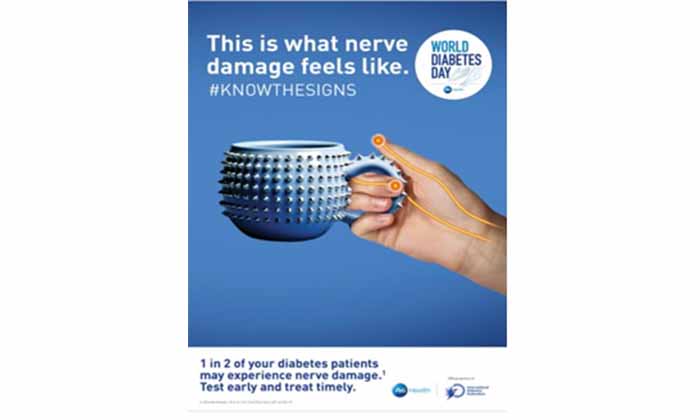Neurobion commemorates World Diabetes Day 2023 with innovative AI – based Experiential Campaign #KnowtheSigns
- 1 in 2 Diabetics and 1 in 10 Pre-diabetics estimated to suffer from Peripheral Neuropathy - Vitamin B Deficiency affects quality of life of ~ 19% of all people with diabetes - #KnowtheSigns step changes Health Awareness by leveraging Artificial Intelligence to make the invisible condition of Peripheral Neuropathy & Vitamin B deficiency visible and more relatable to consumers
In alignment with World Diabetes Day 2023, P&G Health, makers of Neurobion, continued its awareness efforts with an innovative #KnowtheSigns campaign to help consumers and healthcare professionals understand the connection between Diabetes and Pre-Diabetes, with Peripheral Neuropathy (PN) and Vitamin B Deficiency for timely detection, treatment, and improved quality of life.
With Diabetes Mellitus being the leading cause1 of Peripheral Neuropathy (PN), the increasing prevalence of PN is closely linked to the rise in the number of diabetic patients. PN including Diabetic Peripheral Neuropathy (DPN) is the result of damage to the nerves impacting quality of life of people as they are not able to go about their daily lives as comfortably. Symptoms of peripheral neuropathy include numbness, tingling, prickling, and burning sensations in the hands and feet. B vitamin deficiency and aging are other high-risk factors along with diabetes leading to peripheral nerve damage. Published studies across different countries confirm that up to 80% of patients with Peripheral Neuropathy remain undiagnosed and untreated.
Peripheral Neuropathy affects 34–35% of UAE population with diabetes6. Saudi Arabia ranks the second highest in the Middle East and is seventh in the world for the rate of diabetes7. Painful Diabetic Peripheral Neuropathy is seen in over 65% of the patients with Diabetes in Saudi Arabia8
Tarek Abdelaziz, General Manager at P&G Health, Middle East, said, “An estimated 1 in 2 Diabetics and 1 in 10 Pre-diabetics are estimated to suffer from Peripheral Neuropathy. Vitamin B Deficiency affects the quality of life of approximately 19% of all people with diabetes. A key barrier we have identified is the lack of awareness about these conditions, which leads to worsening of symptoms, delay in seeking treatment, and a resultant impact on quality of life. Neurobion #KnowtheSigns campaign is a step towards health awareness on the condition in the UAE and Saudi Arabia. For the first time, we have leveraged Artificial Intelligence to make these invisible conditions of PN & Vitamin B deficiency visible and more relatable to consumers. With this effort, we hope to help people understand the condition by shedding light on daily struggles and symptoms. Not many people are aware that early diagnoses can help enable better treatment outcomes and better quality of life, and damaged nerves can be regenerated if nerve care damage has not progressed too far.”
Neurobion #KnowtheSigns campaign includes a virtual ‘See what they feel’ Photo Exhibit, wherein Real-Life day to day patient experiences from across countries have been brought to life using Artificial Intelligence to help consumers identify early signs of nerve damage and vitamin B deficiency. Further, the company is partnering with pharmacy chains in Saudi Arabia and UAE to create awareness among consumers, especially diabetics, on the importance of early diagnosis and treatment of Neuropathy, and how treatment with B Vitamins such as Neurobion can help in relieving symptoms of tingling and numbness and support healthy nerves.
For more information on the campaign, please write to our media contacts.
Disclaimer: Indications of Neurobion may differ in different countries, please check with your local healthcare professionals for more information.
References:
- Landmann G. Ars Medici. 2013;1: 18-21
- Kumar S, et al. Laser Therapy 2016;25: 141–144
- Ziegler D et al. Neuropathy in prediabetes. Diabetes Metab Res Rev. 2023
- Nix WA et al. Diabetes Res Clin Pract 2015; 107:157–165.
- Adaikalakoteswari A et al. Diabetes Res Clin Pract 2012; 95:415–424.
- https://www.mdpi.com/20734409/12/1/198/pdf#:~:text=A%20recent%20study%20among%20the,diabetes%20%5B3%2C4%5D.
- https://pubmed.ncbi.nlm.nih.gov/26206092/#:~:text=Abstract,3%20million%20have%20pre%2Ddiabetes.
- Halawa MR et al, 2010


Comments are closed.